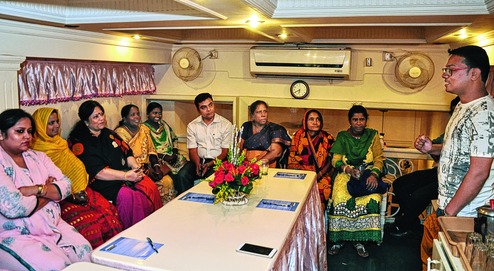
Calcutta: Ruksana Bibi of Topsia goes out collecting waste in the dead of night before civic workers turn up to clean the roads.
Street dogs bark at her, cars stop mistaking her for a sex worker and cops heckle her. The 25-year-old can barely sign her name but ensures her 12-year-old daughter doesn't miss school a single day.
Ruksana was among a group of ragpickers from the Tiljala-Topsia-Park Circus area who met at a north Calcutta restaurant on Thursday evening to share their stories with activists and people from various walks of life.
"Dine N Dialogue with Rag Pickers" was hosted by iVolunteer, an association of volunteers that partners with NGOs, and Tiljala SHED, an NGO that works with ragpickers across Park circus, Tiljala, Topsia and Rajabazar.
Ajmeri Bibi, 40, recalled how glass shards from a bottle at a garbage dump off Canal West Road had left her feet wounded. "I was bleeding but I couldn't afford to skip a day's work," the mother of two said.
Ruksana, Ajmeri and the others live in shanties along railway tracks or canals. They leave home around 3am to scavenge the streets for bottles, broken furniture, paper, carry bags, iron scrap and other things thrown away.
They return home after a few hours to segregate the collection. Once a week, they sell the scrap to dealers in their neighbourhood. For a kilogram, plastic bottles fetch Rs 15 and paper Rs 2. The women make around Rs 1,500 a month.
Their earnings have taken a hit since 2012-13 when the Calcutta Municipal Corporation introduced compactor stations. But even now, more than 20,000 unregistered ragpickers collect around 500 tonnes of garbage, mainly dry and recyclable items, in the city and surrounding areas every day.
The meet had a vegetarian spread, including chilly baby corn, butter naan, dal makhni, malai kofta, paneer makhni and sweets, for the women.
Several speakers spoke about society ostracising ragpickers. Mothers scare children by telling them ragpickers would carry them away in their sacks, Saminah Khan, teacher of a school near Park Street, said. "An educated woman doesn't hesitate to throw an empty packet of chips on the road. But she will be wary of ragpickers who collect them from roads."
Waste management is alien to most city houses, including upscale housing estates, Shafkat Alam, secretary of Tiljala SHED, said.
In 2000, the NGO set up an association of ragpickers. Now, it has more than 2,000 members and most of them have voter and Aadhaar cards and maintain bank accounts.
"We have realised the importance of education and vowed not to have our children in this profession," Manowara Bibi, secretary of the association, said.










